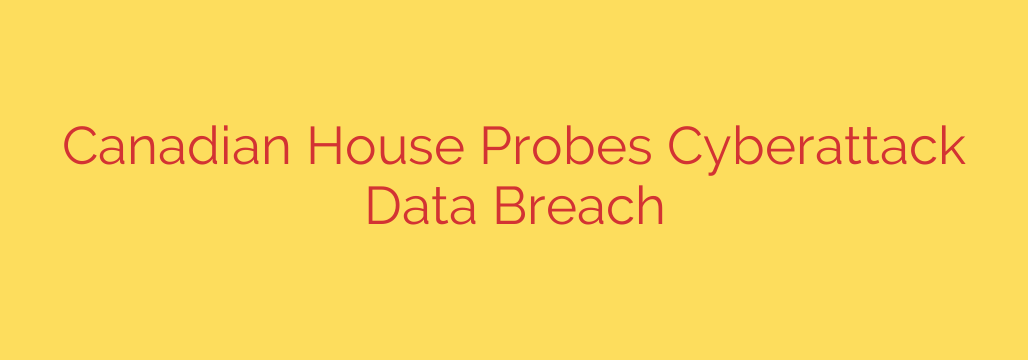
Canadian House of Commons Hit by Major Data Breach: Personal and Financial Info Exposed
A significant cybersecurity breach has compromised the sensitive data of individuals connected to the Canadian House of Commons, including Members of Parliament (MPs) and their staff. The incident, which is currently under a full-scale investigation, highlights the persistent and evolving threats facing even our most secure government institutions.
The attack was not a direct assault on the House of Commons’ internal network. Instead, it targeted a third-party service provider that manages administrative and financial services for MPs and their employees. This type of “supply chain attack” is an increasingly common tactic used by cybercriminals, who exploit vulnerabilities in external vendors to gain access to the data of their primary target.
What Information Was Compromised?
The breach exposed a trove of sensitive personal and financial information. According to officials, the compromised data includes banking details and other personal records belonging to both current and former employees, as well as MPs.
The House of Commons administration is actively working to determine the full scope of the breach and has begun the critical process of notifying all affected individuals. The focus is now on mitigating the damage and ensuring those impacted have the resources they need to protect themselves from potential fraud or identity theft.
Key Points of the Breach:
- Target: The Canadian House of Commons via a third-party vendor.
- Victims: Members of Parliament, their staff, and other employees.
- Exposed Data: Confidential financial information, including banking details, and other personal records.
- Response: An ongoing investigation is underway, and affected parties are being notified.
The Growing Threat of Vendor-Based Cyberattacks
This incident serves as a stark reminder that an organization’s security is only as strong as its weakest link. Many businesses and government bodies rely on a complex network of external partners for everything from HR and payroll to IT management. While this is efficient, it also expands the potential attack surface.
If a third-party vendor has weak cybersecurity protocols, they can become a backdoor for malicious actors to access the sensitive data of all their clients. This is why rigorous vendor security vetting and continuous monitoring are no longer optional—they are essential components of any modern cybersecurity strategy.
Actionable Security Tips: How to Protect Yourself After a Data Breach
While this breach specifically impacts those affiliated with the House of Commons, the lessons are universal. If you ever find yourself involved in a data breach, it is crucial to act quickly and decisively.
Here are essential steps to take to secure your information:
Monitor Your Financial Accounts: Keep a close eye on your bank and credit card statements for any unusual or unauthorized activity. Report any suspicious transactions to your financial institution immediately.
Beware of Phishing Scams: Cybercriminals often use stolen information to create highly convincing phishing emails or text messages. Be skeptical of any unsolicited communication asking for personal information, passwords, or financial details, even if it appears to be from a legitimate source.
Enable Multi-Factor Authentication (MFA): MFA adds a critical layer of security to your online accounts by requiring a second form of verification, like a code sent to your phone. Enable it on all sensitive accounts, especially for email, banking, and social media.
Consider a Credit Freeze or Fraud Alert: Placing a fraud alert with credit bureaus (Equifax, TransUnion) makes it harder for someone to open a new credit account in your name. For maximum protection, a credit freeze restricts access to your credit report altogether.
Strengthen Your Passwords: Avoid using simple, easily guessable passwords and never reuse the same password across multiple sites. Use a trusted password manager to generate and store complex, unique passwords for each of your accounts.
The investigation into this breach will undoubtedly continue to unfold. For now, it underscores the critical importance of digital vigilance for both large organizations and private citizens alike.
Source: https://www.bleepingcomputer.com/news/security/canadas-house-of-commons-investigating-data-breach-after-cyberattack/








